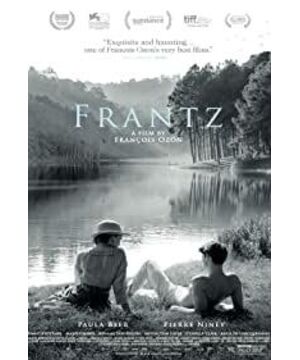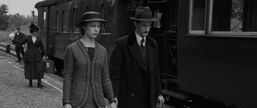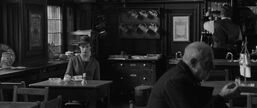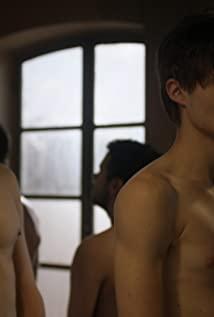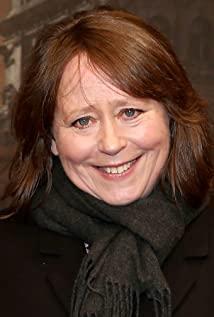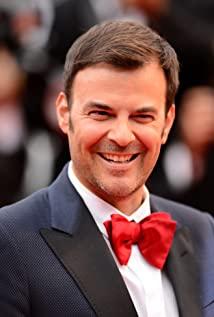The war is over.
In a German town surrounded by greenery, everything is black and white. A young woman, Bella, takes black and white flowers to the cemetery to visit her fiancé Franz, who was killed in battle. There was no body of Franz there. Franz was buried anonymously in France along with most of the dead soldiers. Only a letter from his pocket was sent back, a piece of paper full of thoughts and hopes.
When the young French Adrian came here alone, the traces of the war had not been erased. The national anthem was often sung in the tavern, and people gathered together to carefully cherish the memory of their dead relatives. Everyone squinted at him and talked about him, and the alcoholic on the street corner spit at him after being picked up by him, and Franz's father refused to treat him and kicked him out. Adrian endured it all, and all the indifference pained him, but there was some kind of redeemed relief. He had come here to see the graveyard of Franz, the unarmed enemy he had shot dead.
Adrian was crying in front of Franz's grave, and this scene was seen by Bella. Franz's parents invited him to their home and regarded this gentle and thin young man as Franz's friend. They are so alike, shy, talk less, have a hot heart, play the violin, watch the paintings of the Louvre, and walk the streets of Paris together. The family imagined the happiness of Franz's death, and tried to use these sentences to fill the pain in their hearts. Those fantasies turned into color under the lens. It seems that the happy picture at this time is the reality, and the previous black and white image is only a temporary illusion.
Bella and Adrian were lying on the grass chatting. The black and white skirt and coat had gradually turned pale yellow, which matched her hat. The surrounding green grass was tender and oily. A gust of wind blew the leaves. They looked up at the same time. look around. It's spring.
Adrian played for everyone on Franz's favorite violin. Franz's mother asked him why he was no longer a violinist, and he replied because he could no longer enjoy music. The family was immersed in the memories of the past, but Adrian broke down and interrupted the performance. He escaped from the memories and confessed his pain to Bella at the tomb.
Adrian had only met Franz once, and it was the last time, but he made up all kinds of past with him, saw his cemetery, got to know his family and fiancee, and learned about his dreams and preferences. Franz went from a corpse in a German military uniform to a real, living young man who was also loved by many, and the guilt he felt was unbearable. Adrian mentioned that Franz liked an oil painting, painted by Monet, of a man leaning back. The painting, which he likes, is called suicide, and it shows a man lying down after being shot, exactly the same as Franz's death.
Adrian leaves by train and Bella loses her last solace. Two weeks later, Adrian wrote again begging for forgiveness. Bella told Franz's family that he was doing well in Paris and that he was playing the violin again. The process of replying to the letter was delayed for a long time, and when Bella finally made up her mind to forgive, Adrian had moved out of Paris and disappeared. Franz's parents encourage Bella to go to France to find Adrian.
Bella took the luggage and got on the train alone. The same as what Adrian saw when he first arrived. French couples hug each other in the car and fall asleep, French people stand up and sing marches in taverns, soldiers wounded on the battlefield, and silent listeners listening to classical music.
Bella felt Adrian's mood and sat down in the corner of the Paris tavern. France is so similar. War taught them hatred, and death taught them love, but this love was deeply hidden by sorrow and a sense of responsibility to the country. Love made the Franz family so friendly to receive young people from hostile countries. , and made it impossible for a German woman to sing in the French tavern. As Franz's father used to say, when our children die, they raise their glasses, and when their children die, so do we. We are all people who will raise a glass to the death of a child.
Bella eventually meets Adrian. She no longer mourned her lover all day long, refused to dance, no longer black and white, she couldn't wait to forgive Adrian. But she then saw Adrian's lover, Bella watched them, interrupted the performance, and fled back to her room, knowing that she was not here to forgive Adrian, but for Adrian.
The next day Adrian took her on the train and gave her a parting kiss. He was still so sincere, shy, vulnerable, and affectionate, but Bella became firm.
Maybe because of Adrian, maybe because of his lover, maybe because of this trip, maybe because of that Monet painting on display in the Louvre. Impressionist brush strokes are messy, with light and shadow spots, like piles of paint, just to show a fleeting scene in a certain moment, the painting is called "Suicide", and it depicts a man lying on a bed after being shot.
Bella committed suicide once, as in the picture. But she was rescued, something the people in the painting couldn't understand anyway. The camera finally freezes on Bella's face staring at the oil painting. The picture gradually changes from black and white to color. Bella's cheeks are rosy and her blond hair is neat and tidy. In her eyes, love breaks through grief and confusion and emerges firmly. came out.
She had saved her parents who heard Franz's death in grief, and also saved Adrian's guilt and restless soul. This time, she saved herself.
This is not a movie about war. It's about love, it's about redemption and growth. We are not born to learn to love, but when we are extremely lonely, love gives us hope to live.
If you are also interested in reading books, watching movies and writing movie reviews, welcome to join us [Irregular Critic] (currently in the fifth issue). For details, please click on my homepage or private message.
View more about Frantz reviews


